|
|
|
Sort Order |
|
|
|
Items / Page
|
|
|
|
|
|
|
| Srl | Item |
| 1 |
ID:
130214
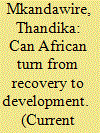

|
|
|
|
|
| Publication |
2014.
|
| Summary/Abstract |
During the last decade or so, Africa, once labeled by the Economist as the "Hopeless Continent," has been rebranded by the same magazine as "Africa Rising." Described by then-British Prime Minister Tony lair in 2001 as "a scar on our consciences," Africa has become the home of "roaring lions" and the "fastest billion"- contrasting with the image of the world's most impoverished "bottom billion," in the words of the economist Paul Collier. These new monikers and the ebullient optimism they reflect are a welcome hange. They have replaced a costly "Afropessimism" that reigned in Western media and academic circles during much of the 1980s and 1990s. The costs of the negative stereotypes of that period were felt not only in terms of Africa's selfesteem but also financially: They depicted Africa as economically much riskier than it ever was and dampened the animal spirits of investors.
|
|
|
|
|
|
|
|
|
|
|
|
|
|
|
|
| 2 |
ID:
130472


|
|
|
|
|
| Publication |
2014.
|
| Summary/Abstract |
The United States is in the early stages of a substantial national project: reorienting its foreign policy to commit greater attention and resources to the Asia-Pacific region. This reformulation of U.S. priorities has emerged during a period of much-needed strategic reassessment, after more than a decade of intense engagement with South Asia and the Middle East. It is premised on the idea that the history of the twenty-first century will be written largely in the Asia-Pacific, a region that welcomes U.S. leadership and rewards U.S. engagement with a positive return on political, economic, and military investments.
As a result, the Obama administration is orchestrating a comprehensive set of diplomatic, economic, and security initiatives now known as the "pivot," or "rebalancing," to Asia. The policy builds on more than a century of U.S. involvement in the region, including important steps taken by the Clinton and George W. Bush administrations; as President Barack Obama has rightly noted, the United States is in reality and rhetoric already a "Pacific power." But the rebalancing does represent a significant elevation of Asia's place in U.S. foreign policy.
Questions about the purpose and scope of the new approach emerged as soon as Secretary of State Hillary Clinton offered what remains the clearest articulation of the strategy, and first used the term "pivot" to describe it, in a 2011 article in Foreign Policy. Almost three years later, the Obama administration still confronts the persistent challenge of explaining the concept and delivering on its promise. But despite the intense scrutiny and short-term setbacks faced by the policy, there is little doubt that a major shift is well under way. And whether Washington wants it to or not, Asia will command more attention and resources from the United States, thanks to the region's growing prosperity and influence -- and the enormous challenges the region poses. The question, then, is not whether the United States will focus more on Asia but whether it can do so with the necessary resolve, resources, and wisdom.
|
|
|
|
|
|
|
|
|
|
|
|
|
|
|
|
| 3 |
ID:
133669
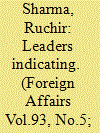

|
|
|
|
|
| Publication |
2014.
|
| Summary/Abstract |
Global investors usually focus on economic data such as GDP growth, employment, and trade. But in today's trying economic climate, they have started to train their gaze elsewhere: on national political leadership and the prospects for reform.
|
|
|
|
|
|
|
|
|
|
|
|
|
|
|
|
| 4 |
ID:
134030
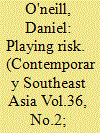

|
|
|
|
|
| Publication |
2014.
|
| Summary/Abstract |
Weak rule of law, corruption and political risk are factors found to deter foreign direct investment (FDI) and all are characteristics of Cambodia's investment environment. Yet Chinese outward FDI has been found to contradict these general trends, as illustrated by high levels of Chinese investment in Cambodia. This article analyses how Chinese firms are able to successfully invest in Cambodia and finds that variation in ownership type (state owned or private), investment size and the degree of mobility of the assets invested determine the Chinese investor's strategy. For China's state owned enterprises (SOEs) in the hydropower sector, Chinese government support in the form of aid and loans to the government of Cambodia secures approval and protection for investments. Private Chinese firms with smaller and more mobile investments in Cambodia's garment industry, on the other hand, rely on industry-wide collective action facilitated by cultural and linguistic ties both to other ethnically Chinese foreign investors and to Chinese Cambodians in the industry. Finally, in the land and resource sector, Chinese firms secure a politically connected local stakeholder to gain approval and protection for large investments.
|
|
|
|
|
|
|
|
|
|
|
|
|
|
|
|
| 5 |
ID:
128310
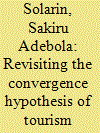

|
|
|
|
|
| Publication |
2014.
|
| Summary/Abstract |
The purpose of this article is to examine the convergence hypothesis in South Africa's tourism markets over the period January 2000-December 2011. To check the existence of convergence, the study follows existing papers by applying a unit root test on the difference series and a cointegration test on the original series of visitor arrivals. Premised on geographical dimension, we further investigate cluster-based convergence within African and overseas source markets in South Africa. The results provide evidence for long-run convergence in tourism markets. Furthermore, the findings of cluster-based convergence provide greater support for the convergence within African and overseas source markets, respectively. These findings imply that previous policies aimed at boosting total visitor arrivals in South Africa have been successful, and maintaining such (or similar) strategies may continue to enhance international visitor arrivals in the country.
|
|
|
|
|
|
|
|
|
|
|
|
|
|
|
|
| 6 |
ID:
122762


|
|
|
|
|
| Publication |
2013.
|
| Summary/Abstract |
Following the secession of South Sudan, Northern Sudan finds itself at a crossroads. Governed since 1989 by the Al-Ingaz regime, Khartoum's political elites are under pressure from the international community and the ordinary Sudanese people to democratise and ditch the autocratic Islamism that has been their hallmark for decades. Omar Al-Bashir and Ali Osman Taha face fierce criticism for presiding over the break-up of Africa's biggest country. Simultaneously, key constituencies in the security services and business community are signalling discontent too, lobbying instead for a further centralisation and the abandonment of the grudging liberalisation that started after Hassan Al-Turabi's removal from power in 1999-2000. Based on interviews with key movement and party members, this article assesses to what extent the Comprehensive Peace Agreement has changed the National Congress Party (NCP) and the Harakat Al-Islamiyya. It examines the internal dynamics within Khartoum's power bloc and argues that the current regime has in many ways become, 'Al-Ingaz without its Islamic soul', dixit one senior Islamist. Despite Bashir's controversial speech in Gedarif in December 2010, during which he called for Sharia and an end to multiculturalism in Northern Sudan, NCP ideologues are eyeing a strategic redeployment of political capital and economic investment, seeking to become an ordinary hegemonic party.
|
|
|
|
|
|
|
|
|
|
|
|
|
|
|
|
| 7 |
ID:
131066
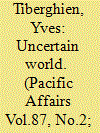

|
|
|
|
|
| Publication |
2014.
|
| Summary/Abstract |
This article provides a response to Brantly Womack's article in this issue on a multinodal view of the global world and China's rise within it. Has globalization ushered in a new and stable structural system based on connectivity and multinodal networks?
I argue here that globalization may be more fragile and beset with system-level risk than in Womack's view. Its future depends on investment in global institutions and global governance by states and networks of private and sub-state actors. Likewise, states may increasingly be caught in networks of interconnections and dependency, while at the same time they must deal with great social forces and struggles that could yet break key links in the system. In sum, agency, political leadership, and institutions matter. The system is dynamic and interactive. It is vulnerable and dependent on active coordination. Even China's trajectory within this system can take very different paths, based on the political choices of its leaders and other players.
|
|
|
|
|
|
|
|
|
|
|
|
|
|
|
|
|
|
|
|
|